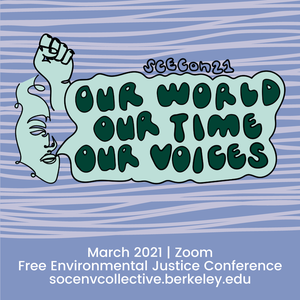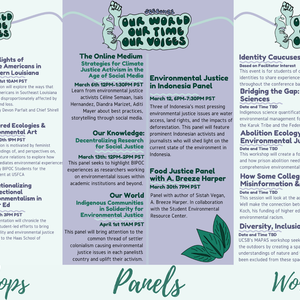SCECon 21: Our World, Our Time, Our Voices
University of California, Berkeley
Project Overview
SCECon 2021: Our World, Our Time, Our Voices aims to recenter the environmental narrative around environmental justice by giving intentional space for students to learn about unique and intersectional environmental topics and share our own view of environmentalism. Starting in March 2021, our 2-month long conference focused on democratizing environmental education through engaging panels and both individual and community-based activism workshops. We were able to engage 500+ students and community members throughout our conference through held 3 main panels and 15+ workshops.
Background
On February 2nd, 2019, the SCEC successfully hosted the Students of Color Environmental Conference (SCECon), the first statewide environmental justice conference for students of color in California with generous funding from TGIF. This conference had 250 registered participants, 19 workshop facilitators, 4 panelists, 2 keynote speakers. Many participants heard about this event through social media, reaching 16,600 people on Facebook alone. 812 people responded “Going” or “Interested”. Many Berkeley students heard about it from Recruitment and Retention Centers -- specifically the Native and Indigenous RRC, Black RRC, and Middle East/North African RRC.
We began planning for SCECon 2020 in the fall 2019 semester, however, due to the COVID-19 pandemic we were forced to postpone it. Our original vision was an in-person conference hosted at UC Berkeley as we were excited to feel the energy in the room, however as the pandemic continued, we realized we might need to adapt our conference. In the Fall of 2020, we trial ran a mini SCECon event, inviting BIPOC students from universities across California to come together and discuss various environmental justice and sustainability-related topics. We had 30+ students from 10+ universities, from UC San Diego, to Stanford, to Cal State Northridge, attend our event and we left feeling hopeful and energized for the possibility of a virtual SCECon.
After careful and meticulous planning and preparation, we began SCECon 21 in March 2021 with our kickoff event The Online Medium: Strategies for Climate Justice Activism in the Age of Social Media, with panelists including Céline Semaan, Isais Hernandez, Diandra Marizet, and Aditi Mayer. We held two other main events including Our Knowledge: Research Justice with panelists Ron Reed, Dr. Chandler Puritty, Margaret Gordon, and Leslie Quintanilla and Our World: Indigenous Communities in Solidarity for Environmental Justice with international panelists Malih Ole Kaunga, Hindou Ibrahim, Tiana Jakicevich, and Lydia Luisa Jennings. We also hosted a variety of other main events in partnership with the UC Berkeley Student Environmental Resource Center including Environmental Justice in Indonesia with activists from the country and Unpacking Food Trauma: A Workshop on Addressing Oppressive Structures Within the US Foodscape with Dr. A Breeze Harper. In addition, we held various workshops led by other fellow student activists and leaders surrounding topics such as the spirituality of zero waste, diversity, equity, and inclusion in the outdoors, gendered ecologies and environmental art, among others. All of our events were recorded and uploaded to our youtube page for future reference and education.
For more information on SCEC as an organization, please refer to our website: https://socenvcollective.berkeley.edu/.
Goals
Our main goals are to showcase a diverse environmental narrative, ensuring that each of our panels and workshops centers around the explicit and intricate links between social justice and environmentalism. Our conference aimed to foster an intersectional environmental movement through empowering and uplifting underrepresented folks in the environmental movement. We prioritized BIPOC panelists and workshop leaders and ensured that all topics presented centered around environmental justice. We hope to lay the groundwork to start a larger conversation and movement about what environmentalism means to us, as students of color in the 21st century.
Implementation
After our successful mini-event in the Fall of 2020, we recruited students to help out with the larger SCECon 21. Our core organizer team included: Sarah Xu, Alyssa Ha, Leonela Leon, Kiana Kazemi, Isaac Aguilar, Savannah Sturla, Jed Lee, and Varsha Madapoosi with additional support from Sarah Naameh, Amy Chu, Satchi Thockchom, and Shine Lee
In late December, we formed subgroups that were focused on organizing their own event, based on their own interests and passions. We finalized three main workshop topics, one focused around social media activism (Kiana Kazemi and Leonela Leon), one around research justice ( Isaac Aguilar and Savannah Sturla), and another on international Indigenous Solidarity (Jed Lee). Another subgroup was formed that was in charge of the logistics and outreach for SCECon (Sarah Xu, Alyssa Ha, and Varsha Madapoosi).
The event subgroups organized the entire logistics of their specific event, everything from reaching out to speakers, moderating panels, handling stipend compensations, and more. After coming up with an overview of the event and outlining overall intentions, the event subgroup created an event proposal and submitted it to the rest of the group. Once approved, they began contacting potential panelists in mid-January through online research and personal connections. During this time, event subgroups also compiled a list of moderating questions and a rough script to follow during the event. After panelists were confirmed, the outreach and logistics team began creating promotional materials and posted them on various social media platforms. About a week before each event’s date, the event subgroups hosted a dry-run with all the panelists to ensure there were no technical issues and that all panelists were briefed on the agenda. On the event day itself, each event subgroup moderated their respective event. We had over 50 live attendees for each event and reached even more people through our recordings and social media summary posts.
The outreach and logistics team was in charge of the organizational structure of the project. They reached out to 1,000 + student organizations internationally through social media and direct email marketing methods. They also formed a slack group with 180+ registrants as a way for environmental student activists to connect before, during, and after our conference. This group was also in charge of all the promotional materials: designing, creating, posting, and captioning each post for our Instagram, Facebook, and website. This group also handled all external communication, responding to inquiries and working with workshop hosts to finalize the logistics.
Although we had split into subgroups, the entire SCECon organizing team met weekly to share updates and progress and were in constant communication with each other through Slack. We found that delegating tasks through subgroups was the most effective method for our team as we were able to focus our efforts on areas we were passionate about/had prior experience in.
For more information on our outreach, events, and planning, please check out our Instagram: https://www.instagram.com/scecberkeley/.
Timeline
Our project started in October of 2020 and finished in April of 2021.
October 2020: Plan for BIPOC environmentalist townhall including logistics and outreach November 20th, 2020: BIPOC Environmentalist Townhall December 2020-February 2020: Preparing and planning for SCECon 21 reaching out to speakers, designing promotional materials, organizing event logistics etc) March 6th 12PM PT : The Online Medium: Strategies for Climate Justice Activism in the Age of Social Media (Panel) March 12: Environmental Justice in Indonesia Event March 13th : 12 PM - 2PM PST: Our Knowledge: Decentralizing Research for Social Justice March 21st 10 AM PST: The Plights of Native Americans in Southern Louisiana March 27th 2:30 pm PT : From the Bay to Cordis, Protecting Land Defenders Workshop March 27th 2.30 PM PST : Land Defenders in the Philippines March 30th at 1PM PST : Gendered Ecologies & Environment Art March 30th at 7pm PT : Unpacking Food Trauma: A Workshop on Addressing Oppressive Structures : March 30th 7PM PST : Food Justice Panel with A. Breeze Harper Within the US Foodscape March 31st at 1pm PT : The Art of Gendered Ecologies hosted by BIPOC Students for the Environment April 1st 11am PT : Our World: Indigenous Communities in Solidarity for Environmental Justice April 3rd 1pm PT : The Spirituality of Zero Waste: A De-colonial Perspective April 3rd 1PM PST : A decolonial perspective: The spirituality of Zero-Waste April 7th at 3pm PT : Abolition Ecology: Prisons as an Environmental Justice Disaster April 17th at 3pm PT : Institutionalizing Intersectional Environmentalism in Higher Ed: Reflection, Challenges and Hope April 25th 11.30 AM PST : Reflections on Environment activism with Circularity April 27th at 11:30am PT : Reflections on Environmental Activism with Circularity
For more information or to watch our events, please check out our youtube page linked here: https://www.youtube.com/channel/UC60qRhMRGjMSUyUmciIT3bw/videos.
Financing
The project was funded through a generous grant from The Green Initiative Fund totaling $28,800.
The costs are listed below: The Online Medium: $5,400 Our Knowledge: $4,000 Our World: $4,600 Workshops: $7,820 Misc: $1,650 Organizer Stipends: $4,620
If you would like additional information on our budget, please contact us and we can provide a further breakdown.
Results
Through our project, we were able to engage students and community members with environmental justice education on a broad scale. As a virtual conference, we had no limitations in terms of venue, food, or other logistical costs, and were instead able to allocate these funds towards more speakers, workshops, and accessibility accommodations.
As quantitative metrics, we were able to hold 20+ events, with 3 main SCECon-organized panels, 2 partnered large events and 15+ community-based workshops. We were able to reach 1,000 students from around the world through our live events, recordings, and social media platforms. We averaged around 60 live attendees for our main panels and around 25 live attendees for our interactive workshops. Our social media presence vastly expanded through SCECon, as we doubled our Instagram follower count (from 400 to 800+), garnered 200+ new Facebook likes for our page and were able to drive traffic to our updated website. We also created a slack group for our attendees and had 180+ registrants, allowing us to have direct communication with our audience.
We received overwhelming support and appreciation from our attendees, with 100% of attendees saying they “enjoyed and gained something valuable from the events”, “The theme, content, and programming of the events was meaningful, relevant, and timely to the environmental movement”, and “the events more accurately reflected the diversity [they are] seeking in the environmental movement”. This truly shows the impact that our conference had: we were able to influence, inspire, and empower students to engage with the environmental movement in new ways that directly tie into racial, social, economic, and political justice.
For more information on our conference, please check out: https://www.ocf.berkeley.edu/~scec/scecon-2021/
Lessons Learned
When taking on a project that has a budget as large as we did, it is important to ensure that there’s adequate time to process stipend payments and other funding allocation requests. It will be extremely helpful to develop a strong connection with the University’s finance center to ensure quick follow-up on these issues, particularly when dealing with payments to speakers or panelists. Another important lesson learned is the importance of documenting our progress as we go. SCECon 21 had many moving parts, with events, workshops, and outreach being planned and developed at the same time. It would have been extremely useful to have a guide of best tips and progress as we went along to help each other out as different organizers run into similar issues.


